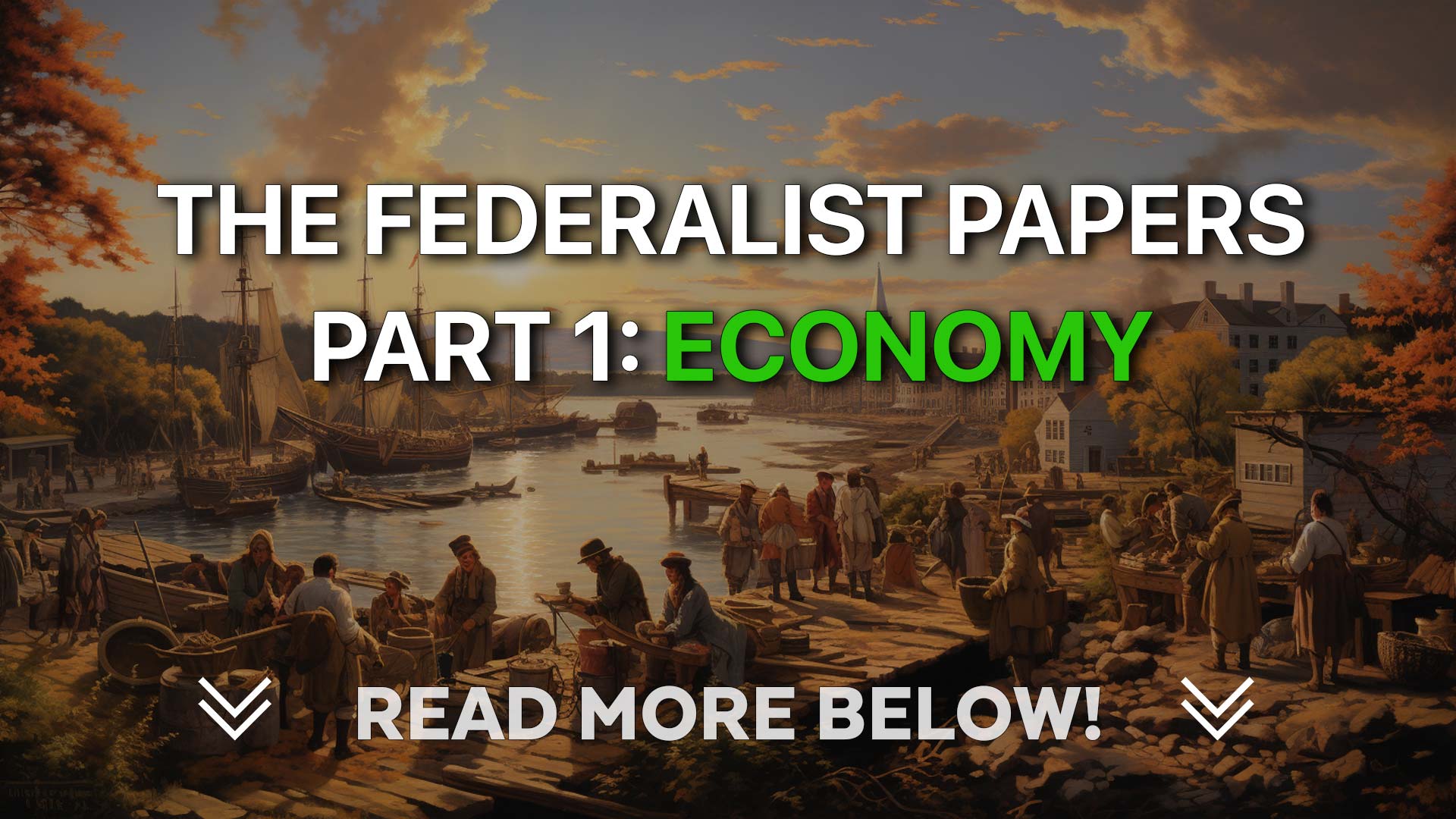I still find it incredible how many people have either never heard of the Federalist Papers or, if they have, don’t know their importance to the creation and ratification of the Constitution — and why they were so needed and remain so relevant today.
Many people try to say the Constitution is fluid and that its meaning changes; that’s simply not true. Amendments allow the people to make changes or additions, but trying to reinterpret what the Constitution means is very dangerous.
It’s very simple; our founders created the Constitution to protect “we the people” from the mob. They knew if the majority got ahold of the levers of control, they would destroy the Republic. That’s why we’ve never had a Democracy.
As our founders said, “A democracy cannot exist as a permanent form of government. It can only exist until the voters discover that they can vote themselves largesse from the public treasury. From that moment on, the majority always votes for the candidates promising the most benefits from the public treasury, with the result that a democracy always collapses over loose fiscal policy…”
Our legislators, judges, etc., need to stick with what our founders framed within our Constitution, not try to make it mean something new; it didn’t then.
The Constitution is to be absolute. If changes must be made, then we the people petition our legislators to create amendments. That’s it! Not for new thinking, new mobs, to make the Constitution mean what they want it to. It’s designed to withstand that, so long as it’s followed by moral people.
In these next posts, I’ll keep them brief but want to demonstrate that what was true then is just as true now.
And the pressing issues we face today might not have been necessary if our courts and public servants had simply followed the greatest document ever created (with the Bible being first, of course) — our Constitution. It’s also important to note that our founders were very clear that we cannot have a Constitutional Republic without Jesus Christ.
Benjamin Rush stated:
“The only foundation for a useful education in a republic is to be laid in religion. Without this, there can be no virtue, and without virtue, there can be no liberty, and liberty is the object and life of all republican governments.”
“Such is my veneration for every religion that reveals the attributes of the Deity or a future state of rewards and punishments that I would rather see the opinions of Confucius or Mohammed inculcated upon our youth than see them grow up wholly devoid of a system of religious principles. But the religion I mean to recommend in this place is the religion of Jesus Christ.”
Rush additionally stated:
“Freedom can exist only in the society of knowledge. Without learning, men are incapable of knowing their rights, and where learning is confined to a few people, liberty can be neither equal nor universal.”
It’s crucial that some remember and more learn the importance of these sacred essays.
Let’s start today with their thoughts on the economy and the government’s role in it when they created our Constitution.
The Economy:
The founders of the United States were brilliant men who understood the dangers of government overreach. They knew that a free market economy was the best way to promote economic growth and prosperity.
John Jay, Federalist No. 4:
Jay, in Federalist No. 4, emphasized the dangers external entities posed to our economy, arguing for a strong centralized government to protect our commercial interests. Yet, he did not advocate for a government so robust that it curtailed domestic economic freedoms.
In Federalist Paper 10, James Madison wrote:
“It is of great importance in a republic not only to guard the society against the oppression of its rulers, but to guard the rulers also against the oppression of the people.”
This quote highlights the founders’ belief that the government should be limited in its power and that the people should be protected from government overreach.
In Federalist Paper 11, Madison continued his discussion of the dangers of government overreach and wrote:
“The public good, and the means of promoting it, are the objects of government. Government is instituted to protect property from violations, and to secure to every one the enjoyment of all the rights of person and possession.”
This quote highlights the founders’ belief that the government’s primary role is to protect individual rights and property.
James Madison, Federalist No. 44 and the Constitution:
Madison, a primary architect of our Constitution, believed firmly in delineating the powers of government. In Federalist No. 44, he asserted that undue governmental interference in the economy could lead to a form of economic tyranny. The Constitution, in Article 1, Section 8, grants Congress the power “To regulate Commerce with foreign Nations, and among the several States, and with the Indian Tribes.” However, these powers are limited and enumerated, ensuring the federal government does not overstep its bounds.
Alexander Hamilton, Federalist No. 12:
Mr. Hamilton, ever the advocate for a robust yet restrained central government, recognized the power of commerce. In Federalist No. 12, he pronounced, “The prosperity of commerce is now perceived and acknowledged by all enlightened statesmen to be the most useful as well as the most productive source of national wealth.” Yet, Hamilton also cautioned against excessive governmental interference. A government that becomes too enmeshed in the economy risks stifling the very commerce it seeks to promote.
In Federalist Paper 51, Alexander Hamilton explained the system of checks and balances and wrote:
“Ambition must be made to counteract ambition. The interest of the man must be connected with the constitutional rights of the place. It may be a reflection on human nature, but it is nevertheless true, that men have not been stained by every vice which has disgraced our species, without some instruction derived from our own experience.”
This quote highlights the founders’ belief that the system of checks and balances is essential to preventing any one branch of government from becoming too powerful.
The founders of the United States were wise men who understood the dangers of government overreach. They knew that a free market economy was the best way to promote economic growth and prosperity. We should heed their warnings and limit the role of government in the economy.
Federalist No. 11 (Alexander Hamilton):
Hamilton discusses the benefits of a unified economic system for the states, suggesting the potential for America to rival other nations in terms of commercial power:
“An unrestrained intercourse between the States themselves will advance the trade of each by an interchange of their respective productions, not only for the supply of reciprocal wants at home, but for exportation to foreign markets.”
The Slippery Slope to Communism:
An oversized government, deeply embedded in the economic affairs of its citizens, veers dangerously close to the principles of communism—a system wholly alien to our founding values. Such unchecked power invariably restricts individual freedoms and stifles entrepreneurial spirit. As declared in our Declaration of Independence, governments derive “their just powers from the consent of the governed.” It is not the government’s role to direct the economy but to protect the rights of its citizens to pursue their economic endeavors freely.
The vision of an open and unhindered trade among states is a testament to the foundational principles of a free-market economy. As states freely exchange their unique goods and services, not only do they fulfill the mutual needs of their citizens, but they also harness the potential to tap into global markets. This unrestricted flow of commerce amplifies each state’s economic strength and fosters an environment of innovation, competition, and prosperity. Such a vision underscores the immense value and potential of a free-market system, where barriers are minimal, opportunities are vast, and the collective benefits are shared by all.
If we impose stringent restrictions on interstate trade and stifle the free exchange of goods and services, we risk sliding towards a centralized system of control, reminiscent of communism, where individual enterprise and state autonomy are overshadowed by overarching governmental directives.
Is that not what we are seeing today?
History repeats itself, we must learn and re-learn it, or be doomed to it.
In Conclusion:
A government that becomes the principal actor in the nation’s economy, rather than its protector and arbiter, risks the very foundations upon which our great Republic was built. While the federal government has a role in ensuring fair commerce, protecting our interests, and maintaining fiscal responsibility, it must refrain from becoming an omnipotent economic actor. The writings, be it in the Federalist Papers, the Constitution, or the Declaration of Independence, emphasize this balance, urging restraint, wisdom, and an unyielding commitment to liberty.
We’ve got to get back to the basics, to the foundation our founders laid out for us. The path we’re on now? It never ends well for us, the people. When I look at the state of our economy, the prices of things like food, gas, rent, even homes, it’s clear we’re living the consequences of straying from what our founders intended. The folks in charge right now need to wake up and change direction before we reach a point of no return. We’ve got to educate them.
Beadles
P.S.
Benjamin Franklin:
Franklin often extolled the virtues of industry and thrift. He once asserted, “Beware of little expenses; a small leak will sink a great ship.” This serves as a metaphorical warning against governmental profligacy, emphasizing fiscal responsibility. The government, like the individual, should be judicious in its expenditures and wary of unnecessary intrusion into the free market, lest it lead to economic stagnation or destruction, as our current path indicates. This is no small leak; it’s a gaping rip through our hull.




